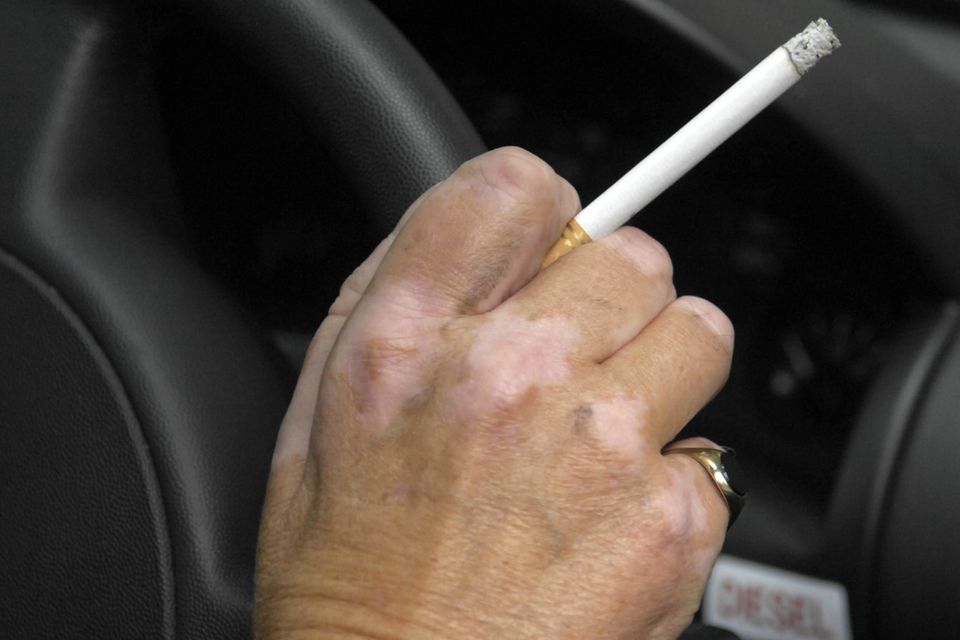Police 'still await power to fine on the spot for smoking in cars with children'
The Police Federation of England and Wales said officers cannot yet issue Fixed Penalty Notices to drivers smoking with children in their cars
Police are still waiting to be given the power to issue fines to people smoking in cars with children a year after the crackdown was launched, according to the organisation that represents rank-and-file officers.
The Police Federation of England and Wales argued that a "piece of the jigsaw is missing" in the regime.
The Department of Health said police can pass information to local authorities who can issue the penalty notice and collect the fines, while h ealth campaign groups said the legislation has worked well and compliance has been high.
It became illegal in England and Wales to smoke in a car or other vehicle with anyone under the age of 18 present from October 1 last year, with motorists or passengers facing a £50 penalty.
But figures obtained through Freedom of Information requests have suggested enforcement of the ban has been minimal.
The BBC reported in June that only three forces reported incidents in the first seven months, and all were dealt with by verbal warnings.
Jayne Willetts, lead on r oads policing for the Federation, said: " It's been really difficult for our members to enforce this law, because since the change of legislation police have still yet to be given the power to issue a fixed penalty notice (FPN).
"The original plan was for the public health authority to seek to change the law and give police extended powers.
"This would allow officers to stop motorists and issue on-the-spot fines, like they currently do for other offences, such as using a mobile phone while driving. But because that hasn't happened, a piece of the jigsaw is missing."
The Federation said options available to officers are to give someone a verbal warning or report them to local authorities.
Society needs to take responsibility for the issue, Ms Willetts added. She said: " At the end of the day, this is a societal issue, not just one that can be solved by law enforcement alone."
Action on Smoking and Health said a survey shows that 86% of children in 2016 have reported no exposure to smoking in cars compared with 83% last year.
According to the poll, the law prohibiting smoking in cars with under-18s is supported by 87% of adults in England - and it is also backed by three quarters (76%) of smokers.
ASH chief executive Deborah Arnott said: " Compliance with the legislation on smoking in cars with children is dependent on the level of public support, not enforcement action.
"And people are complying with this popular law which protects children from the harm caused by second-hand smoke."
A report produced by the Chartered Institute of Environmental Health (CIEH) and Improving Performance in Practice (IPIP) looking at compliance levels with the legislation found that more than eight out of 10 people knew there was such a law and all those interviewed agreed that such legislation should exist.
Ian Gray, principal policy officer for the CIEH, said: "Our study shows that compliance with the smoke-free private vehicles legislation has been high.
"People are aware of the law and during the surveys, at no point were children found in a car while an adult was smoking.
"In fact, there is positive evidence of local authorities and police forces working collaboratively to enforce the new law.
"The legislation was introduced to protect children from the harmful effects of second-hand smoke and considering high compliance levels, this is another positive step for public health initiatives in England."
A Department of Health spokeswoman said: "We have always been clear that the measure of success for this legislation will be in changes in attitude and behaviour, not the number of enforcement actions.
"It is encouraging to see that recent reports show compliance is high and the new law is popular.
"The police can use the traffic offender report to pass information to local authorities who can issue the fixed penalty notice and collect the fines.
"Information on this process has been sent to police forces who already use these for a variety of traffic-related offences."
Join the Belfast Telegraph WhatsApp channel
Stay up to date with some of Northern Ireland's biggest stories

